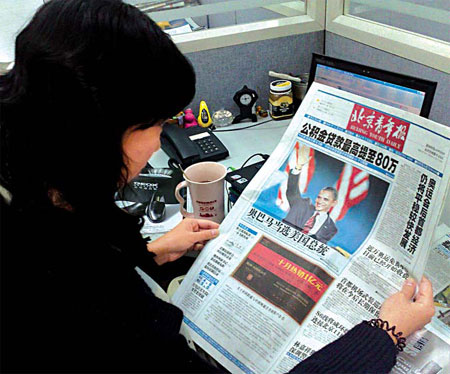
|
BIZCHINA> Center
 |
|
Related
Changes to Sino-US economic ties?
By Zhang Yuwei and Wang Xu (China Daily)
Updated: 2008-11-10 12:49
 US President-elect Barack Obama, from the first day of his campaign, caught voters' attention with his campaign slogan - "The Change We Need". When he takes office early next year, will there be any changes to Sino-US economic ties? Despite Obama's repeated criticism of China's alleged manipulation of its currency, most experts say the next US president will further boost trade and investment between the two nations. And closer collaboration between the two countries will prove particularly important for both countries to cope with the current global financial turmoil. Just rhetoric? Even before his victory, Obama's hawkish stance on Sino-US trade aroused concern among Chinese observers. Obama outlined his China policy in the October 2008 issue of the American Chamber of Commerce in China's China Brief magazine. Being concerned about job losses in the Unitted States, he indicated that he would "use all the diplomatic avenues" to seek a change in China's currency practices, which he claims give the nation's exporters an unfair advantage. In previous comments to the US National Council of Textile Organizations, he also vowed to step up the fight against unfair trade practices and increase funding to America's primary trade watchdog, the Office of the US Trade Representative. The world's fourth-largest economy is now running a massive surplus with the United States. In 2007, it surpassed Japan to become the second-largest trading partner of the US, but the US has a record $256.3 billion trading deficit with China. "There may be more skirmishes about the renminbi exchange rate at the beginning of the Obama administration," says Shen Dingli, a professor of the Centre for American Studies at Fudan University in Shanghai. "But a further rise in the yuan may be a difficult choice for the Chinese government at the moment." Since China scrapped the peg between the renminbi and the US dollar, the currency has gained about 20 percent against the greenback. In recent months, it has also appreciated against the euro, the currency of China's biggest trading partners. This has already pushed up the prices of Chinese exports, which led to the closure of thousands of factories in coastal areas. Still, most observers tend to associate Obama's criticism of China with his efforts to appeal to blue-collar voters in swing states, who have been the victims of globalizaiton. Some analysts say China's competitvely priced products have forced a plethora of US companies out of business. Moreover, as growing numbers of US businesses shift low-end manufacturing to low-cost countries, some US politicians are also blaming China, one of the largest destinations for foreign investment, for the job losses in the US. Although presidential candidates tend to talk tough on China-related issues during the campaign, they later chose to cooperate with the nation after entering the White House. "There's usually a difference between what they say and what they do when they take office," says Kenneth Jarrett, former US consulate-general in Shanghai. "But the Sino-US relationship is characterized by continuity and less by personality." "The challenge will be how to find a way that supports domestic industry in the US while maximizing established trade relations with China so that they create a win-win situation," says Shen. Analysts say Obama owes a large part of his victory to the perception that he has a better grip on the economic crisis, but he has yet to prove this in reality. And how the US cooperates with other nations, especially less-affected economies such as China, will prove important for him to turn these perceptions into reality. "It is no time to start apportioning blame," says Anthony Saich, a professor of International Affairs at the Kennedy School of Government at Harvard University. "The US and China need to sit down and work out a collaborative response to the current financial turmoil." Shrinking global economy Despite the government's latest moves to bail out its ailing financial companies, the US, as well as the world economy, now appears to be on the verge of a recession. The International Monetary Fund, in a forecast released last Friday, predicted that the economies of the United States, Europe and Japan will shrink in 2009. If that turns out to be the case, it would mark the first annual decline by such "advanced economies" since World War II. To deal with the worst "financial crisis since the Great Depression", the new US administration has to work more closely with other nations. Over the past weeks, there have already been signs of this trend as central bankers around the world opted to lower interest rates almost simultaneously. "The new US administration will need to work with its trading partners like China to take corrective action to stimulate the economy," said James Zimmerman, chairman of the American Chamber of Commerce in China. Zimmerman said AmCham-China believes that ongoing dialogue and engagement between the US and China benefits both countries, and especially during this time of international economic crisis. The new US administration is expected to continue to sell Treasury bonds to other countries to finance its stimulus package. As a result, the world's fourth-largest economy, with nearly $2 trillion in foreign-exchange reserves, will prove to be an important loan source. "If we don't buy US Treasury bonds, Obama will not be able to get enough money for his stimulus package, and a quick recovery in the US will be more difficult," says Lu Chengyuan, an analyst with Haitong Securities. "But by doing that, China will also suffer." (For more biz stories, please visit Industries)
|